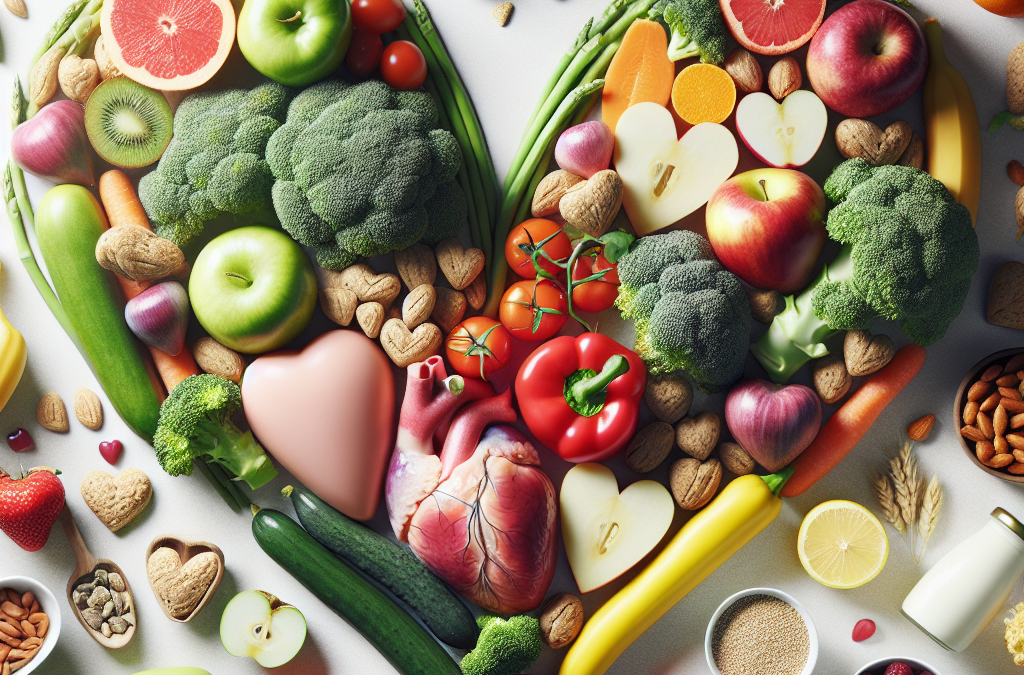Fruits and Vegetables
Why They Matter
Let me tell you, fruits and veggies are absolute rockstars when it comes to heart health! Packed with vitamins, minerals, and antioxidants, these powerhouses help to lower blood pressure and improve cholesterol levels. I used to think I could skate by without them, but once I started incorporating more, I noticed a big difference. Eating a variety is key because different colors mean different nutrients.
One of my favorites is a huge salad loaded with greens, tomatoes, peppers, and a drizzle of olive oil – it’s like a party in my mouth and my heart is dancing! I try to get five servings a day; that’s my personal challenge. Whether it’s a smoothie in the morning or some roasted veggies in the evening, variety keeps it exciting.
And let’s talk about fruit! Berries, in particular, are amazing. They’re not only delicious but also known for their heart-protective properties. I often toss some blueberries or strawberries in my oatmeal or yogurt, making for a super healthy breakfast that satisfies my sweet tooth.
Whole Grains
The Heart Health Connection
Switching to whole grains was one of the best decisions I made for my diet. Whole grains like oats, brown rice, and quinoa are rich in fiber, which helps lower cholesterol and keeps our hearts happy. Initially, I was skeptical; I thought whole grains would be boring, but man, was I wrong!
Each morning, I whip up a bowl of oatmeal with nuts and fruits, and it’s so filling! There are a ton of whole grain options that can easily replace white bread and pasta. I even tried a quinoa salad that blew my mind – it’s a fabulous base for different flavors!
Plus, I’ve learned that whole grains keep your digestive system running smoothly, which is just an extra bonus. Including them in every meal has become a fun challenge for me. I love discovering new recipes and ways to enjoy them!
Healthy Fats
Understanding the Good from the Bad
Now, healthy fats might seem a little paradoxical when we think of heart health, but trust me, they can be your best friend! Incorporating sources like avocados, nuts, and olive oil can give your heart the love it needs. I was always worried about fats, but learning about the difference between healthy and unhealthy fats changed my outlook completely.
I adore using olive oil instead of regular oils when cooking. It not only adds flavor but also provides beneficial acids that can help lower cholesterol. You’d be surprised how a splash of it can elevate any dish! And avocados? Honestly, they’re like nature’s butter—delicious on toast or in a salad.
Don’t forget about nuts! Throwing a handful into my snacks has not only been satisfying but also so beneficial for my heart health. They contain omega-3 fatty acids, which are fantastic for keeping our hearts in tip-top shape.
Fish and Lean Proteins
Savoring the Benefits
Fish, particularly fatty fish like salmon and mackerel, has become a staple in my kitchen. They’re loaded with omega-3 fatty acids, which are known to be great for heart health. Since I started eating fish at least twice a week, I can genuinely feel the difference—more energy and just better overall health.
Get an Amazing Discount on the Best Certified Organic Whole Food Supplement!
When I cook fish, I keep it simple. A quick bake in the oven with lemon and herbs makes it flavorful without losing its nutrients. It’s also super quick, which is a lifesaver! If you’re not a fish person, lean poultry like chicken or turkey can be excellent substitutes, too.
And don’t overlook plant-based proteins! Beans, lentils, and chickpeas are not only heart-healthy but also versatile and filling. There have been weeks where I swapped out meat for lentils and honestly, it was a game-changer for my heart and my waistline.
Nuts and Seeds
The Power Packed Snack
Let’s wrap this up with the magic of nuts and seeds! These little guys are often overlooked, but packing them into my diet has been a thrilling adventure for my heart. Almonds, walnuts, chia seeds, you name it—each one brings unique health benefits.
What’s great about nuts is their convenience. They’re incredibly easy to snack on, which is why I always keep a jar handy. A handful of walnuts in the evening has become one of my favorite rituals; they’re known for supporting heart health, and they also keep hunger at bay.
Seeds like flaxseeds and chia seeds deliver a serious boost of fiber and omega-3s. I sprinkle them on my morning smoothie or toss them into my baking—keeping things interesting. It’s become like an edible art project, layered with texture and flavor that loves my heart right back!
FAQ
1. Why are fruits and vegetables essential for heart health?
Fruits and veggies are packed with essential vitamins, minerals, and antioxidants that help lower blood pressure, improve cholesterol levels, and reduce the risk of heart disease.
2. What are some examples of whole grains I should include in my diet?
Oats, brown rice, quinoa, and whole grain bread are excellent options that provide fiber and essential nutrients for heart health.
3. Can you explain the difference between healthy and unhealthy fats?
Healthy fats, like those from avocados, nuts, and olive oil, help improve cholesterol levels and heart health, while unhealthy fats, such as trans fats found in many processed foods, can increase the risk of heart disease.
4. How often should I consume fish or lean proteins?
It’s recommended to include fatty fish in your diet at least twice a week, alongside other lean protein sources for balanced nutrition.
5. What are some easy ways to add nuts and seeds to my meals?
You can easily sprinkle nuts or seeds on salads, blend them into smoothies, or mix them into baked goods for added crunch and nutrition.





